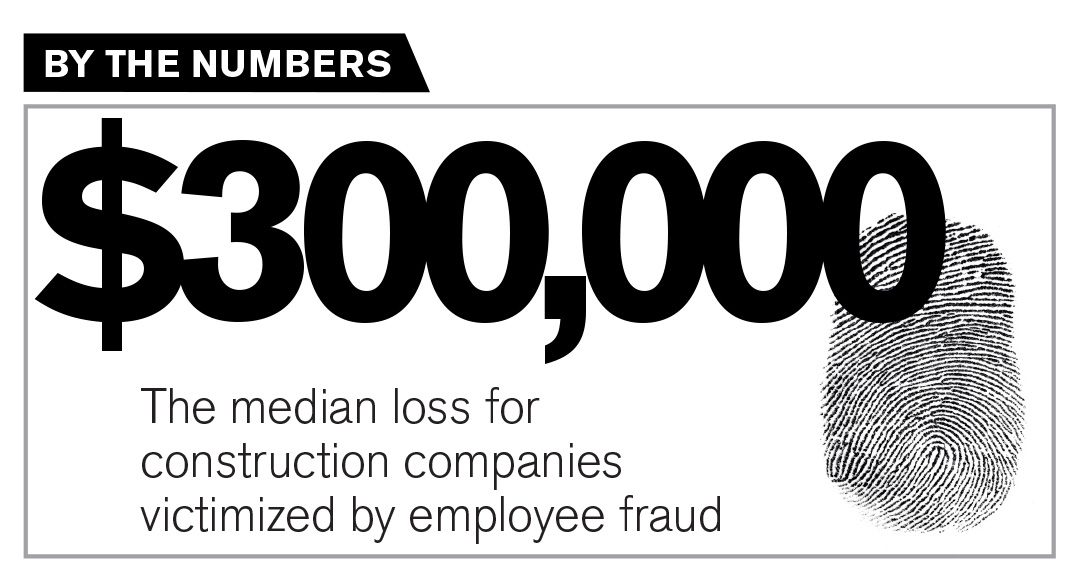
The news media is full of stories about construction companies victimized by employee fraud. While many contractors spend time and energy thinking about projects and the problems that could arise, they often overlook a major and costly risk—the possibility that a trusted employee will commit fraud within the company.
Employee-perpetrated fraud can be devastating: The Association of Certified Fraud Examiners’ “2012 Report to the Nation” states that the median loss for construction companies victimized by employee fraud is $300,000. Of the 23 industries included in the report, only mining and real estate suffer heavier losses than construction.
The Criminal Profile
Never assume an employee won’t steal from you. Of those who perpetrate fraud and are caught, less than 10 percent have a criminal background. Most have never received a violation more serious than a speeding ticket. In fact, the typical “fraudster” is a long-term employee who has built trust during years of service to the company and is often the kind of person colleagues consult for advice.

With time, such employees can earn an owner’s confidence. They may be allowed to make unquestioned decisions and often have access to company assets. An alarming finding included in the “2012 Report to the Nation” shows a direct correlation between fraud loss amounts and the fraudster’s length of employment: Longer lengths of employment are linked to higher fraud loss amounts. Trust is not an internal control—the work of even trusted employees should be subject to review and oversight.
Unique Fraud Risks
When it comes to employee fraud schemes, contractors are as vulnerable as companies in other industries. However, complex, multi-phase projects on multiple work sites are unique to construction, making it an easier target for certain types of fraud.
Without procedures to help prevent fraud, the following schemes can be easy for construction industry employees to perpetrate:
Bonuses and Incentives
Carefully monitor employee bonuses or incentive arrangements. Shifting costs away from projects that start to look less profitable (or even falsifying job profitability reports) can be tempting for some employees, particularly if their compensation is strongly tied to project profitability.
To prevent this type of fraud, don’t allow project employees to assign costs to jobs if their compensation depends on meeting project profitability targets.
Kickbacks
Long-term employees often develop friendly relations with materials suppliers and subcontractors. In fact, some project managers may even agree to artificially inflate pricing in exchange for gifts or cash under the table.
To mitigate this risk, require your project managers to obtain competitive bids for materials or subcontractors over a specified amount, and then periodically verify that they have obtained the bids. A knowledgeable employee other than the project manager should also review supplier and subcontractor invoices.
Fictitious Suppliers and Subcontractors
Fictitious suppliers and subcontractors are common and often take the form of suspicious-looking services. For example, an employee might create fictitious invoices at home for “project consulting” services and submit them for payment to an unsuspecting bookkeeper. Checks are cut and mailed to a P.O. Box (or home address) that the fraud perpetrator controls.
If you are an owner or manager, sign all checks, and review supporting invoices for suspicious suppliers or subcontractors. In addition, always require approval for new suppliers or subcontractors to help prevent this type of fraud. Perform due diligence before adding a new vendor to your accounting system. In other words, know who you are doing business with, and ensure that the vendor actually exists.
Corporate Credit Card Abuse
Fraud in the form of charging personal items to corporate credit cards has become epidemic. To combat this abuse, implement strong credit card policies, obtain receipts for transactions and subject credit card statements and receipts to a diligent review process. This type of fraud can go undetected for an extended period of time when review processes are not sufficient to monitor for inappropriate transactions.

Common Symptoms
Like a disease, fraud often has symptoms that are noticed long before the crime is exposed. Many companies could have uncovered fraud had they noticed the warning signs along the way, including the following red flags:
- Employees who refuse to take vacations or are overly protective of their work
- Long delays in receiving regular financial reports or job profitability reports
- Bank accounts that go unreconciled for several months
- Employees who begin to work odd hours when fewer co-workers will be around
- Employees who improve or maintain their lifestyle despite financial hardships
- Unexplained budget-to-actual variations
Prevention
Whether you operate a large or small company, there are steps you can take to reduce your company’s chances of being a victim of fraud. Below are a few basic fraud-prevention tips you may have overlooked:
Establish an ethical culture. The foundation of fraud prevention is a company culture in which ethics and integrity are highly valued. Without these values, few other fraud-prevention strategies will work. Many companies have implemented codes of conduct and fraud policies that employees are required to review and sign annually.
Use anonymous reporting hotlines. The number one way fraud is detected is by tips. Most tips come from employees, but customers and vendors are also important sources of tips. Provide employees, suppliers and subcontractors an anonymous hotline to report fraud and abuse. This strategy has proved to be one of the most effective methods of combating fraud, and many companies now offer hotline services. Where a hotline is present, fraud is uncovered faster, and losses are lower.
Separate duties. No single employee should perform every accounting-related duty. Many fraud incidents involve long-time bookkeepers whose work is rarely reviewed or questioned.
Make vacations mandatory. Because fraud is often discovered during an employee’s absence, require employees to take at least one full week of vacation, and enlist another employee to perform their duties.
Receive bank statements at home. Owners of smaller companies should consider having company bank statements sent to their home address. Review the statements (and cancelled checks), and ask your accounting staff questions about transactions. Potential fraudsters are less likely to commit fraud if they believe an owner or manager reviews their activities.
Provide fraud awareness training. Fraud awareness training for employees is a fundamental part of any company’s fraud-prevention efforts. Organizations that provide fraud training generally experience lower losses. Fraud is not a problem that can be addressed only by training the accounting department, internal auditors or external auditors. Creating an employee workforce that is knowledgeable about fraud issues and knows what to watch for is a much more effective way to prevent fraud. You need the help of every employee to prevent and detect this kind of activity.
No strategy is foolproof, but the more fraud prevention measures you introduce to your company, the better your chances are of stopping fraud before it starts.
